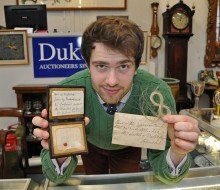The grey strands are to go under the hammer at Duke’s of Dorchester along with hair from a horse that charged at the French.
Napoleon’s expansionist ambitions were thwarted for good after his defeat by the Duke of Wellington at the battle in modern-day Belgium 200 years ago.
Such was the infamy of the Corsican dictator that all items linked to him were instantly of interest and collectable and have remained so ever since.
These strands of hair were taken from his head while he was exiled in St Helena in the South Atlantic where he died in 1821 aged 51.
A note of provenance with them states: “Hair of Napoleon given by Marchand the Emperor’s Valet de Chambre when in St Helena.”
Louis Marchand became a loyal royal servant in 1811 and followed Napoloen to his first exile to Elba and then to St Helena.
The hair is kept in what looks like a Victorian-era box and it is expected to fetch up to £400 at the sale.
Hair of a horse that took part in the Battle of Waterloo is expected to make a similar amount at the sale on March 12.
A note with the horse hair that is kept in an envelope states: “Hair of the charger [obscured] that carried Wheeler in the Battle of Waterloo.”
It is signed ‘Somerset’, thought to be Fitzroy Somerset – later Lord Raglan – who was close to Wellington.
In the battle his arm had to be amputated – but he asked for it back so he could retrieve a ring that his wife had given him.
Written in a good hand, it’s thought Somerset penned the note of authenticity sometime after Waterloo when he had learned to write with his left hand.
Timothy Medhurst, from Duke’s, said: “These two relics have come from the same vendor and are especially relevant this year – the 200thanniversary of the Battle of Waterloo.
“Napoleon’s hair is held down with some red wax and has an historic note about where it came from.
“A theory had been put forward that Napoleon was killed by arsenic poisoning and a previous sample of his hair showed high levels of the drug.
“However, that theory is now thought to be unlikely and it is far more probable that he died of stomach cancer as the original autopsy concluded.
“The hair from ‘Wheeler’s’ charger is a rare item of something that actually took part in the battle in June 1815.
“There was a Private William Wheeler at the battle who wrote a famous memoir, but it is unlikely he’d have been on horseback. It would have more likely been from an officer or
cavalryman.
“But 200 years after Napoleon was finally defeated there is still huge interest in him and the battles of that era.
“We anticipate interest from collectors around the world who want a little piece of history.”












